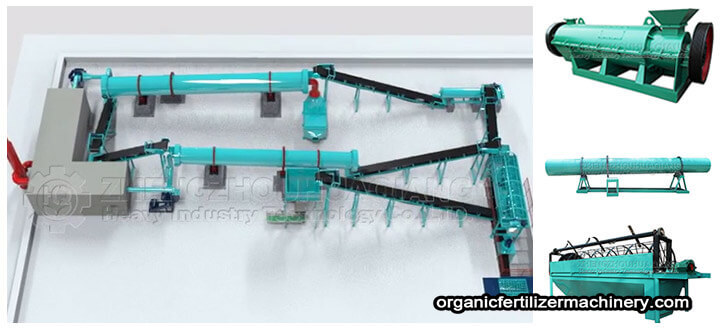Organic fertilizer production lines are crucial for the resource utilization of agricultural waste, and scientifically configured organic fertilizer production equipment is the core guarantee for the efficient operation of this production line. The configuration must cover the entire process from raw material processing, fermentation and composting, deep processing and shaping, to finished product packaging. Each stage of equipment must perform its specific function and work closely together to ensure stable organic fertilizer quality and high production efficiency, which is a vital support for promoting the large-scale development of green agriculture.

In the raw material pretreatment stage, crushers and mixers are indispensable "pre-processing assistants." Crushers can adjust the particle size according to the different characteristics of raw materials such as livestock and poultry manure, straw, mushroom residue, and traditional Chinese medicine residue. This avoids large pieces of raw material affecting fermentation uniformity and increases the specific surface area of the raw materials, accelerating microbial decomposition efficiency. Mixers, through spiral or paddle-type mixing structures, precisely mix various raw materials and fermentation agents according to the specified ratio, ensuring consistent composition in each batch of raw materials. This eliminates the problem of insufficient local composting or over-fermentation from the source, laying a good foundation for subsequent stages.
The core equipment in the fermentation stage—the compost turning machine and fermentation tank—must be flexibly selected according to the production scale. Trough-type compost turners are suitable for large-scale production lines. Through hydraulically driven turning teeth, they periodically turn the raw materials, achieving not only aeration and oxygenation but also exchanging high-temperature and low-temperature zones within the compost pile to maintain optimal fermentation temperature and shorten the composting cycle. Vertical fermentation tanks, with their sealed design and intelligent temperature control and deodorization systems, require less floor space and are particularly suitable for businesses near urban areas with limited land resources or strict environmental regulations, effectively solving the odor nuisance problem associated with traditional fermentation.
The deep processing stage is crucial for enhancing the commercial properties of organic fertilizer, requiring the coordinated operation of granulators, dryers, coolers, and screening machines. Among granulators, disc granulators are suitable for producing small spherical particles with high granulation rates and low energy consumption; rotary drum granulators can produce larger particles to meet the fertilization needs of different crops. After granulation, the granules need to be dried to a suitable humidity level to prevent mold growth during storage. They are then cooled in a cooler to stabilize their shape and prevent condensation inside the packaging bags. Finally, they are screened by a multi-layer sieve; granules with the correct particle size proceed to the next stage, while those that fail are returned to the crusher for reprocessing, improving raw material utilization.
Finally, a quantitative packaging machine uses a weighing sensor to precisely control the weight of each bag. Combined with automatic sealing and coding functions, it achieves integrated "weighing-sealing-labeling" operations, significantly improving finished product delivery efficiency. This entire system, operating as an assembly line, transforms agricultural waste into high-efficiency organic fertilizer, solving environmental pollution problems while providing high-quality fertilizer for agricultural production, forming a green and circular industrial closed loop.